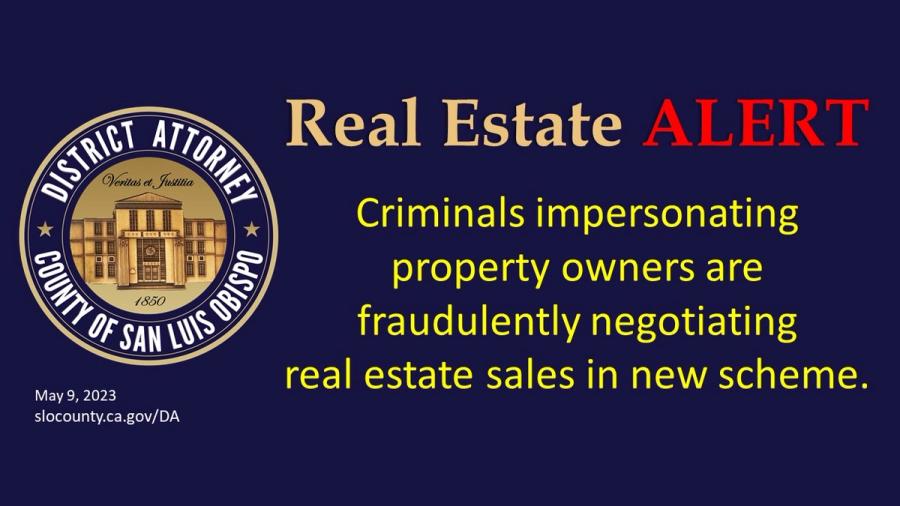
In recent weeks there have been numerous reports of real estate fraud involving criminals who are posing as property owners and contacting real estate agents to sell a property that they do not own title to. The criminals have engaged the real estate professional by impersonating the property owner and are attempting to negotiate the sale of properties which are vacant or lien free.
District Attorney Dan Dow urges all real estate professionals to beware of a new scam that is now happening frequently. Law enforcement agencies in several California counties have observed a recent sharp increase in reports of real estate fraud associated with the sale of vacant land and unencumbered property. Criminals are posing as property owners and through a series of impersonations are negotiating the sale of properties which are vacant or lien free.
The San Luis Obispo County District Attorney’s Office is investigating seven such attempts within our county occurring since mid-April. The District Attorney’s Office Real Estate Fraud Unit has already notified county-wide real estate associations, title companies, and the County Clerk-Recorder’s Office.
Property owners are encouraged to check their property address using a trusted real estate website such as Zillow or MLS (Multiple Listing Service) to determine if their property has been fraudulently listed for sale. Additionally, owners may conduct a property title search using the County Clerk-Recorder website official record search.
If you discover that your property has been fraudulently listed for sale or sold, contact District Attorney Investigator Eric Vitale at (805) 781-5868.
How the scheme works
- The criminal searches public records to identify real estate that is free of mortgage or other liens and to identify the property owner. Properties often include vacant lots or rentals.
- The criminal, posing as the property owner, contacts a real estate agent to list the targeted property for sale and requests it being listed below the market value to generate immediate interest.
- The criminal, posing as the proper owner, requests preference for a cash buyer, and quickly accepts an offer.
- The criminal, posing as the property owner, refuses to sign closing documents in person, and requests a remote notary signing.
- The criminal or co-conspirator impersonates the notary and provides falsified documents to the title company or closing attorney.
- The title company or closing attorney unwittingly transfers closing proceeds to the criminal.
- All communication is electronic, not in person.
How it is discovered
- Often when recording the transfer of documents with the relevant county.
- This scheme has particularly affected the elderly and foreign real estate property owners as there are no means to automatically notify the legitimate owners.
- The burden of verification is on the real estate and title companies.
How to prevent falling victim
- Conduct open-source research for the identity and a recent photo of the purported seller.
- Request an in-person or virtual meeting and to see government issued identification.
- Be on alert when a seller accepts an offer below market value in exchange for receiving the payment in cash and/or closing quickly.
- Use trusted title companies and attorneys for the exchange of closing documents and funds.
Link: https://www.slocounty.ca.gov/Departments/District-Attorney/Latest-News/2023/May/District-Attorney-urges-Real-Estate-professionals-.aspx